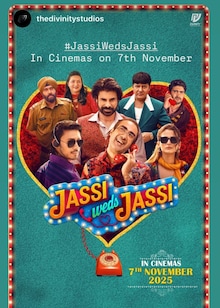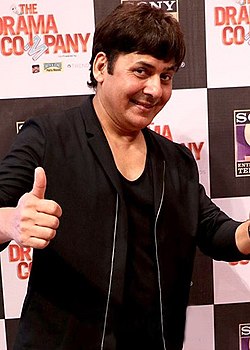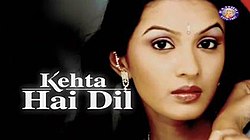Jassi weds Jassi


Jassi is on a quest for love and meets Jasmeet, but complications arise when another Jassi, Jaswinder, enters the picture. With the meddling of Sehgal and Sweety, misunderstandings spiral out of control, leading to a hilarious and chaotic journey toward romance that Jassi never expected.
November 7
2025
Release Date
Hindi
Language
1 minutes
2 hours
Running Time
Cast


Ranvir Shorey


Sikandar Kher


Sudesh Lehri


Grusha Kapoor













Harshvardhan Deo













Rehmat Rattan













Manu Rishi Chadha













Amit Vikram Pandey













Navneet Gairola













Harshit Verma













Pratima Bharti













Supriti Batra













Junaid Ali













Uditi Singh













Kalyani Gangola













Abhishek Sengar
2.5
Average Rating
The above-mentioned average rating is based on the derived ratings of multiple review platforms
OH Review


Review of Jassi Weds Jassi
Plot
Set against the charming backdrop of 1990s Haldwani, “Jassi Weds Jassi” invites the audience into a nostalgic realm where love stories unfold over landline calls, mixtapes, and handwritten letters. The narrative revolves around its protagonist, Jaspreet (affectionately known as Jassi), portrayed by Harshh Vardhan Singh Deo, who finds himself entangled in a complicated romantic pursuit. His journey to win the heart of Jasmeet (Rehmat Rattan) spirals into chaos when he crosses paths with his elder brother Jaswinder, affectionately nicknamed Jassi as well (Sikandar Kher). Along with this central dilemma, the film introduces a secondary story involving Sehgal (Ranvir Shorey) and Sweety (Grusha Kapoor), a couple facing their own turbulence due to misunderstandings fueled by jealousy and suspicion. The film ambitiously seeks to recreate the innocent charm of classic romantic comedies with layered plots that revolve around mistaken identities and the comedic chaos that ensues, aiming to tug on the heartstrings of those yearning for simpler love stories. With multiple twists and turns, the plot delivers a series of misunderstandings that send characters spiraling in directions they never intended. Although the film glamorizes the challenges of romance through a mix of humor and sentiment, it occasionally falters by leaning too much into predictability—one might find themselves guessing developments much ahead of their reveal. The heart of the film lies in its intricate sewing of nostalgia, tracing the echoes of that era where romance was alive and well. Elements like rotary phones and cassette tapes are not mere props but are thoughtfully integrated into its storytelling. Although the story carries a whimsical tone, it sometimes borders on repetitiveness, especially in the first half. The pacing feels uneven, with the narrative taking its sweet time to unfold—a deliberate choice perhaps, to accentuate the charm of the era being depicted. Despite its shortcomings, what shines through is the potential for emotional depth. The film aims to transport viewers back to a time where love was pure and heartfelt, even if the execution occasionally falls short of capturing that idealism entirely. Ultimately, “Jassi Weds Jassi” crafts a romantic comedy atmosphere that oscillates between hilarity and pathos—a journey worth taking, provided one can overlook a few bumps in the road.
Acting
The performances in “Jassi Weds Jassi” are among its most redeeming qualities, with a solid cast bringing to life the quirky characters that populate this love story. Harshh Vardhan Singh Deo shines as Jaspreet, infusing his character with an endearing awkwardness that resonates with anyone who has ever been in love. His heartfelt portrayal of a hopeless romantic attempting to navigate the tumultuous waters of relationships adds authenticity to the film. Rehmat Rattan as Jasmeet complements his performance beautifully; her innocent demeanor brings warmth and charm, making their on-screen chemistry feel genuine and relatable. Sikandar Kher, playing the role of Jaswinder, manages to balance the overprotectiveness of an elder brother with a comedic undertone. While his character follows a familiar narrative blueprint, Kher’s dedication to the role lends a freshness to the portrayal, making audiences root for him despite his character's more conventional traits. Amongst the supporting cast, Ranvir Shorey emerges as the standout, delivering lines with impeccable timing and showcasing his skill in blending humor with a dose of realism. His performance encapsulates the struggles of a modern-family man while effectively eliciting laughs in the right moments. Grusha Kapoor, stepping into the role of Sweety, captures the essence of a suspicious partner competently, even if the character itself sometimes feels like a stretch from deeper storytelling. Meanwhile, the partnership of Manu Rishi Chadha and Sudesh Lehri injects a playful banter that serves as light comic relief—adding color to the narrative tapestry. Yet, while the performances are commendable and the actors fully commit to their roles, one can’t help but feel that there’s a greater potential left untapped, especially for versatile actors like Ranvir Shorey, whose skills deserve more dynamic challenge. In the end, the cast makes a worthy attempt to rise above the script's limitations. Their engagings interactions keep the audience hopeful through the predictable narrative. Even with their commendable efforts, the film needs a touch more spark in its writing to create a lasting resonance—something that feels almost plausible but ends up lacking that final punch. The comedy of errors, while intriguing, could have made for a more dynamic range—perhaps something that better utilizes the talents of its brilliant cast.
Cinematography
The cinematography of “Jassi Weds Jassi” succeeds in immersing viewers in a nostalgic 1990s world. The film's visual storytelling, helmed by a skilled crew, recreates the quaint charm of small-town India impeccably. The warm color palette evokes a sense of familiarity and comfort—an inviting backdrop that mirrors the simplicity and innocence of the time. The locations—bustling streets filled with the sounds of laughter, the vibrancy of family gatherings, and the enchanting settings of Haldwani—are beautifully captured, providing a palpable atmosphere that feels both poetic and heartfelt. The film makes good use of production design, reconstructing the iconic elements of the 90s such as rotary phones, cassette tapes, and the vibrant ambiance of North Indian weddings, all of which add to the film's charm. Each frame envelops the viewer in a sense of nostalgia, highlighting the cultural specificity of the depicted era through details that evoke memories. The effort to portray relatable scenarios, from tea stalls to family homes, contributes significantly to grounding the film in a reality all too familiar to those who experienced the era. However, while the visuals present a delightful backdrop, the cinematography's role in enhancing emotional depth sometimes falters. Some scenes feel flat and lack that crucial dynamic movement that could elevate pivotal moments. For instance, while the film occasionally attempts sweeping shots to capture the essence of its setting, the framing could have been more experimental to capture the excitement and chaos typical of romantic entanglements. The comedic moments could have benefited from tighter framing that encapsulates character expressions at just the right time, ensuring that the laughter is timely. Furthermore, the pacing could have been adjusted to keep the energy flowing, particularly in the film's first half, which drags at times. That said, the commitment to capturing the spirit of the 90s shines through, and the cinematography does manage to instill the charm of the era into the storytelling effectively. Overall, “Jassi Weds Jassi” is visually appealing and certainly transports the audience on a delightful trip down memory lane, characterized by its nostalgia that’s both heartfelt and meticulously crafted. With a little more creativity in conveying the emotional core, the cinematography could have elevated the film beyond good to truly outstanding.
Direction
Paran Bawa’s directorial approach in “Jassi Weds Jassi” embodies a mix of traditional filmmaking with a fresh splash of modern cinematic flair. His vision in weaving a story grounded in nostalgia while appealing to contemporary sensibilities is commendable. Bawa’s ability to navigate through the chaotic layers of romance and humor suggests a confident hand at directing, providing a platform for humor that feels organic and unforced, rather than overly reliant on slapstick elements or gimmicks. The film’s pacing, however, fluctuates, particularly in the first half, which tends to feel stretched and lacks the energy that often defines romantic comedy. Bawa takes his time allowing the audience to feel the warmth of bygone eras, and while this intentional slow burn may resonate with some, many contemporary viewers might find themselves yearning for a tighter narrative arc. However, once the film enters its latter half, the chaos and misunderstandings kick in, breathing new life into the story, showcasing Bawa’s skill in building tension and laughter through layered storytelling. Under Bawa's direction, the cast is able to deliver engaging performances, and he demonstrates a keen understanding of character nuances, allowing actors to shine in their respective roles. His choice of setting and art design does justice to the vibrant aesthetics of the 90s, giving audiences a complete package—transporting them not just geographically but emotionally to a time long past. Moreover, one notable strength of Bawa’s direction is the way he encapsulates the essence of familial bonds, a hallmark of Indian storytelling, all while threading humor seamlessly into otherwise emotional scenarios. His focus on genuine character moments allows for a realistic portrayal of relationships, offering audiences bits of comedy that arise naturally from the quirks of daily life. Nevertheless, while Bawa’s approach is refreshing, there are moments where a stronger directorial intervention could have elevated the storytelling, particularly in emotional sequences where a deeper dive into character motivations could enhance the viewer’s investment. Ultimately, “Jassi Weds Jassi” finds its footing through the successful balance of heartwarming scenarios and light-hearted comedy, thanks to Bawa’s standing vision as a director. His commitment to encapsulating a bygone era’s charm runs through the narrative, creating a delightful—even if occasionally uneven—journey into romance.
Conclusion
In conclusion, “Jassi Weds Jassi” stands as a nostalgic tribute to the essence of 1990s romance, encapsulated within a delightful romantic comedy framework. While the film stumbles through some conventional approaches and pacing issues, its charm lies in its sincere performances, endearing character interactions, and a visual representation that fully immerses the audience in its lovingly crafted world. Harshh Vardhan Singh Deo and Rehmat Rattan breathe life into the heart and soul of the film, supported by a commendable ensemble cast that enhances the storytelling. It holds a mirror to an era when love was tender, easily confused, and often punctuated by humor derived from day-to-day life—a beautiful reminder that simplicity often breeds the most heartfelt connections. The film may not hit every note perfectly, with some predictable plot points and uneven pacing that might deter more perceptive viewers. Yet, the overall storytelling experience remains engaging and leaves behind a warmth meant to echo long after the credits roll. Director Paran Bawa’s reverence for the bygone era makes “Jassi Weds Jassi” a sweetly nostalgic trip, ebbing along with the rhythm of bygone love stories, neatly connecting viewers to their own experiences. While not without its flaws, the film offers a refreshing respite from the rapid pace of modern romantic dramas, trading in the typical loudness for sincere character-driven comedy that highlights the joy of simply being alive, and loving slowly. So, if you’re looking for a film that feels like a warm hug filled with laughs and nostalgia, “Jassi Weds Jassi” might just be the perfect choice. With charming performances and a heartfelt take on love, it invites you to reminisce on simpler times and perhaps to rediscover the magic of old-school romance. Ultimately, “Jassi Weds Jassi” reminds us that love, like good cinema, is meant to be savored—filled to the brim with laughter, nostalgia, and heartfelt moments that make the journey just as valuable as the destination.
Share this review
The Great Reviews
India Today
Times of India
More like this
Tu Meri Main Tera Main Tera Tu Meri
In Tu Meri Main Tera Main Tera Tu Meri, in a world of family expectations, two individuals discover love while embarking on personal journeys. As their bond ...
The Great Shamsuddin Family
In The Great Shamsuddin Family, a dedicated writer struggles to meet a crucial deadline as her home spirals into chaos. With a family emergency unfolding, sh...


